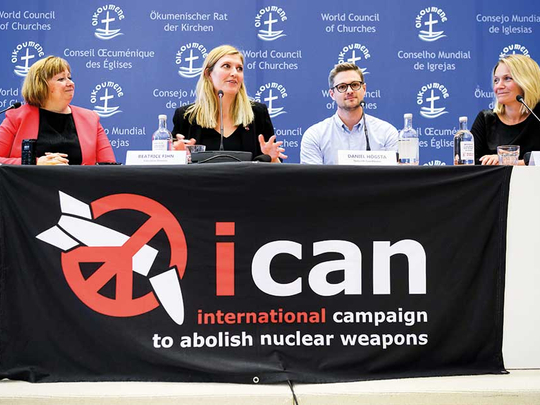
Brussels: The International Campaign to Abolish Nuclear Weapons (Ican) won the Nobel Peace Prize on Friday, a recognition of its efforts to avoid nuclear conflict at a time of greater danger than at any other period in recent memory.
The Norwegian Nobel Committee said that it was honouring the group in part because of its efforts to foster an international Treaty on the Prohibition of Nuclear Weapons, which was approved in July by the United Nations and opened for signatures last month. The 10-year-old grass-roots civil society movement pushes for nuclear disarmament across the world.
The committee recognised the group for “its work to draw attention to the catastrophic humanitarian consequences of any use of nuclear weapons and for its groundbreaking efforts to achieve a treaty-based prohibition of such weapons”, chairwoman Berit Reiss-Andersen of Norway said as she announced the prize in Oslo.
“There is a popular belief among people all over the world that the world has become more dangerous, and that there is a tendency where we experience that the threats of nuclear conflict have come closer,” Reiss-Andersen said. The group has been successful in “engaging people in the world who are scared of the fact that they are supposed to be protected by atomic weapons,” she said.
The Geneva-based coalition, which was modelled on international efforts to ban landmines, says it has branches in more than 100 countries. In a measure of the sudden surge in interest in the group, its website was down on Friday morning following the announcement.
The award is “a message to all nuclear-armed states and all states that continue to rely on nuclear weapons for security that it is unacceptable behaviour,” the group’s Swedish executive director, Beatrice Fihn, told reporters after the announcement. “We will not support it. We will not make excuses for it. We can’t threaten to indiscriminately slaughter hundreds of thousands of civilians in the name of security. That’s not how you build security.”
Fihn told The Washington Post in a telephone interview: “The risk of nuclear war has grown exceptionally in the last few years, and that’s why it makes this treaty and us receiving this award so important.”
Saying that “we do not have to accept” this intensified risk, Fihn added: “We do not have to live with the kind of fear that Donald Trump could start a nuclear war that would destroy all of us. We should not base our security on whether or not his finger is on the trigger.”
She said that her group recognises that nuclear weapons would not disappear any time soon, but she said it is still a realistic long-term goal.
“Keeping nuclear weapons legal isn’t going [to] help things,” she said.
A founding cochairwoman of the group, Rebecca Johnson of Britain, said that anti-nuclear campaigners recognise the challenge of persuading nuclear powers to agree to give up their weapons. Of the 122 countries that have signed onto the nuclear ban treaty, none possesses them.
But she said the group believes that the treaty creates an international norm that will eventually pressure nuclear-armed countries into compliance, even if they never sign the agreement.
“Nuclear weapons became a tool for weak leaders to take shortcuts instead of providing their own people with safety, security and food,” Johnson said in a telephone interview. “We have to take that value away in order to pull down numbers to zero.”
She said nuclear tensions between Washington and North Korea represent a setback to world peace.
“That has to be done with diplomacy and politics, and definitely not nuclear sabre-rattling between Donald Trump and Kim Jong-un,” she said. “They are very dangerous leaders that think they are exercising nuclear deterrence but in their irrationality are actually risking nuclear war.”
The Nobel Committee said the award was not intended as a slap at any particular country or leader, but rather is an effort to encourage all nations to give up their nuclear weapons in the name of a safer world.
The award comes at a moment when world peace seems especially fragile. North Korea in recent months has embarked on a series of ambitious tests of nuclear weapons technology and has threatened to strike the mainland United States. Trump and the North Korean government have traded an escalating series of insults and threats of war.
Meanwhile, Trump is poised next week to decertify Iran’s compliance with a deal limiting its nuclear program, a step that European allies worry would derail the effort to keep Iran from building nuclear weapons. Under the 2015 accord, Iran pledged that “under no circumstances” would it “ever seek, develop or acquire any nuclear weapons” and said its aim was only to make progress on “an exclusively peaceful” nuclear energy programme.
Separately, the 1991 Nobel Peace Prize laureate, Burmese leader Aung San Suu Kyi, has come under fire for failing to stop or condemn the ethnic cleansing of her nation’s Rohingya Muslim minority in recent months.
Last year’s prize was awarded to Colombian President Juan Manuel Santos just five days after Colombian voters narrowly voted against the peace accord that was the basis for the Nobel honour. The Nobel Committee said it hoped the prize would encourage the two sides in the conflict — one of the world’s longest-running — to keep pursuing peace despite the setback. Since then, the peace process has held, although the role of the Nobel remains unclear.












